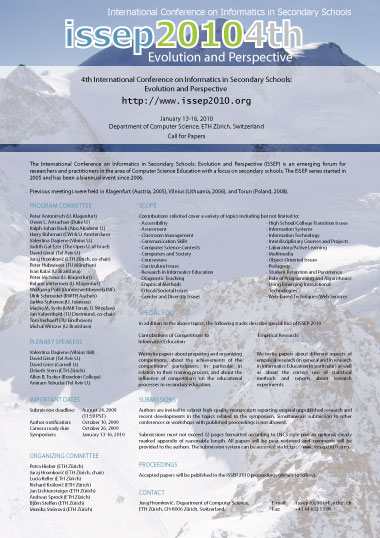Call for Papers

Contributions solicited cover a variety of topics including but not limited to:
- Accessibility
- Assessment
- Classroom Management
- Communication Skills
- Computer Science Contests
- Computers and Society
- Courseware
- Curriculum Issues
- Research in Informatics Education
- Diagnosis and Individual Advancement
- Empirical Methods
- Ethical/Societal Issues
- Gender and Diversity Issues
- High School/College Transition Issues
- Information Systems
- Information Technology
- Interdisciplinary Courses and Projects
- Laboratory/Active Learning
- Multimedia
- Object-Oriented Issues
- Pedagogy
- Student Retention and Persistence
- Role of Programming and Algorithmics in Education
- Using Emerging Instructional Technologies
- Web-based Techniques/Web Services
Special tracks
In addition to the above list of topics, the following two tracks describe special foci of ISSEP 2010.
Contributions of Competitions to Informatics Education
Taking part in different kinds of competitions provides a valuable contribution to the knowledge acquirement and supports the development of the problem solving skills in a creative way. Organizing a competition includes addressing the following two questions:
- Which kinds of competitions are especially well suited for achieving which goals?
- How should one create and choose tasks and rules for such competitions?
ISSEP 2010 will feature a special track on this topic; this track will be opened by an invited talk given by Valentina Dagiene. We invite contributions describing and analyzing the following aspects:
- Preparing and organizing competitions.
- Achievements of the competitions' participants, in particular in relation to their training process.
- Influence of competitions on the educational processes in secondary education.
We also encourage the submission of papers about creating particularly nice tasks with pointers to the knowledge acquired when having solved them.
Empirical Research
Research in Informatics Education, a science with strong empirical components, has to address the same questions as any other empirical research:
- What is "good emprical research"?
- Which rules should be followed to produce "good" emprical results?
- Which criteria can be applied to recognize "good" emprical results?
- What are the pitfalls of interpreting emprical results?
The goal of this special track at ISSEP 2010 is to bridge between the researchers in different communities and foster their collaboration.
We invite papers about different aspects of empirical research (in general and in Research in Informatics Education in particular) as well as about the correct use of statistical methods and reports about research experiments.
Submissions
Authors are invited to submit high-quality manuscripts reporting original unpublished research and recent developments in the topics related to the symposium. Simultaneous submission to other conferences or workshops with published proceedings is not allowed.
Submissions must not exceed 12 pages formatted according to LNCS style plus an optional, clearly marked appendix of reasonable length. All papers will be peer reviewed and comments will be provided to the authors.



